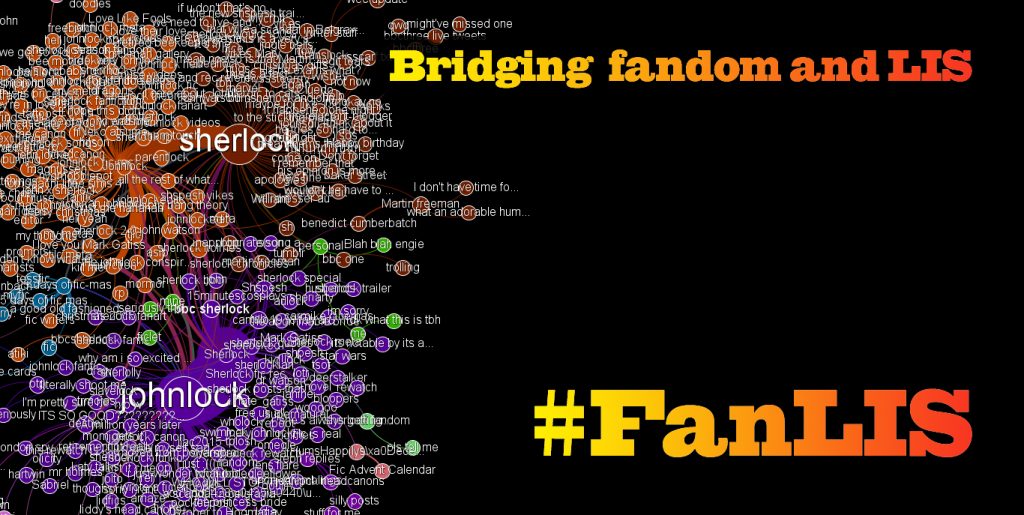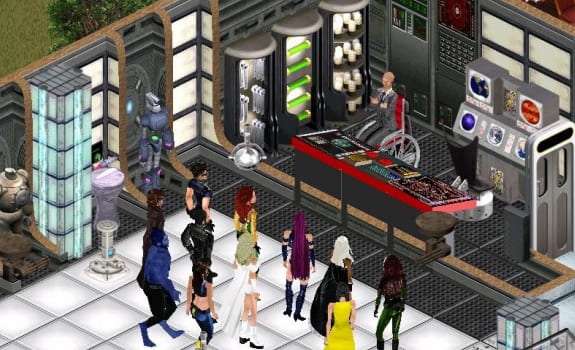
Image © Ludi Price CC-BY-NC-SA
Call for Presentations – all authors welcome!
***Rescheduled to 20th May 2021***
***Please note that this call has now closed, and the Programme and registration details will be available soon!***
One day CityLIS symposium to explore the intersection between fandom, fan studies and library and information science. April 9th 2020 at City, University of London.
Recently the fan studies community has become interested in building bridges between different cultures and disciplines, with Dr. Naomi Jones, during the Fan Studies Network Conference 2018, emphasising the importance of interdisciplinarity in moving the field forward. This challenge was taken up by Kelley, Price, Schuster and Wang in the Fan Studies Network Conference of 2019, where they presented their interdisciplinary, collaborative project on fandom, which started in the Spring of 2018. This collaboration brought together scholars from the fields of cultural studies, the digital humanities, and library and information science to talk about fandom and fan practice, and has allowed a wider exchange of ideas between disciplines.
In common with fan studies, library and information science has a keen interest in the utility of their research outside the field, and in understanding to what extent it produces an impact outside its own disciplinary boundaries. For example, while library and information science (LIS) has a rich history of user studies, its impact outside of the field is less clear, despite multidisciplinary studies being shown to have more impact (Ellegaard & Wallin, 2015). Thus, it would seem that this is the perfect opportunity to bring members of these two disciplines – fan studies and LIS – together, in order to move the concept of ‘interdisciplinarity’ away from just a subject of conversation, towards something real and tangible.
Fan practice shows many parallels with the interests of information professionals, such as librarians, archivists and curators. Fans are ardent collectors (Geraghty, 2014); they take pride in the classification of their work; they develop best practice in the preservation of fanworks (Swalwell et al., 2017); and as some of the first adopters of the internet (Jenkins, 2006), they are comfortable using technological innovations which many information professionals have yet to embrace. Other fan activities with which LIS has overlapping engagement are the publishing of fanfiction as mainstream literature (Peckosie & Hill, 2015), classification of fanfiction, such as on the Archive of Our Own (Price, 2019), and copyright, to name but a few. Rarely, however, does LIS literature acknowledge the relevance of work carried out in the fan studies discipline, e.g. Versaphile’s (2011) look at the preservation of fannish history and Johnson’s (2014) look at fanfiction metadata. Likewise, there is little evidence that fan studies authors are aware of the rich troves of relevant work carried out within the LIS discipline. This creates a significant lacuna in knowledge, which could be assuaged by a less siloed approach to research conversations.
This symposium aims to be part of the nascent interdisciplinary dialogue, by bringing together scholars from fan studies, LIS and beyond, to find commonalities, inspire new conversations, and reveal hidden and unexpected intersections that will enrich the current discourse of fandom and fan practice.
We welcome proposals for 20 minute presentations relating to topics that draw links between, and are relevant to, issues both within fan studies, fandom and LIS, and to other liminal spaces associated with these disparate disciplines. We encourage work that presents perspectives from non-Western and transcultural standpoints.
Topics can include, but are not limited to, the following:
- Beta-reading and the fan as editor
- Classifying fanworks, e.g. tagging, fan genres
- Fandom and libraries/archives/museums/galleries
- Fanzines, and fan self-publishing
- Fandom and information literacy
- Fandom, education and peer-learning
- Fandom and cultural memory
- Crowdsourcing
- Fan news and fans as ‘citizen journalists’
- Fandom and the digital humanities
- Fans as author
- Fans as collectors and curators
- Participatory culture
- Fandom and social media
- Preservation of fanworks, including complex objects such as costume, figurines, dolls, gaming mods, etc.
- Collaborative projects between fans and cultural institutions such as libraries, archives and museums
We are hoping to receive proposals from people from all stages in their academic career, including students and early career researchers; and also from people of colour and other cultural/non-Western backgrounds. We are open to longer style workshop and installation-type formats.
Please send your 500 word proposals to both Ludi Price at Ludovica.Price@city.ac.uk and Lyn Robinson at lyn@city.ac.uk by midnight on December 31st 2019.
Authors of successful proposals will be notified by January 31st 2020. Presenters will be expected to make their own way to City, University of London, but there will be no charge for presenting at, or attending the event, which we hope will be accessible to all those interested in fandom and LIS.
We are looking into open access publishing options for the proceedings of this event.
References
Ellegaard, O., and Wallin, J. A. (2015). The bibliometric analysis of scholarly production: How great is the impact? Scientometrics, 105(3), 1809-1831. https://doi.org/10.1007/s11192-015-1645-z
Geraghty, L. (2014). Cult Collectors: Nostalgia, Fandom and Collecting Popular Culture. Abingdon: Routledge.
Jenkins, H. (2006). Fans, Bloggers and Gamers: Essays on Participatory Culture: Exploring Participatory Culture. New York: New York University Press.
Johnson, S. F. (2014). Fan fiction metadata creation and utilization within fan fiction archives: three primary methods. Transformative Works and Cultures, 17. http://dx.doi.org/10.3983/twc.2014.0578
Peckosie, J., and Hill, H. L. (2015). Beyond traditional publishing models: an examination of the relationships between authors, readers, and publishers. Journal of Documentation, 71(3), 609-626. https://doi.org/10.1108/JD-10-2013-0133
Price, L. (2019). Fandom, Folksonomies and Creativity: the case of the Archive of Our Own. In: Haynes, D. and Vernau, J. (eds.). The Human Position in an Artificial World: Creativity, Ethics and AI in Knowledge Organization, ISKO UK Sixth Biennial Conference London, 15-16th July 2019, 11-37. https://doi.org/10.5771/9783956505508-11
Swalwell, M., Ndalianis, A., and Stuckey, H. (eds.) (2017). Fans and Videogames: Histories, Fandom, Archives. New York: Routledge.
Versaphile (2011). Silence in the library: archives and the preservation of fannish history. Transformative Works and Cultures, 6. http://dx.doi.org/10.3983/twc.2011.0277
This is a cross post originally published on the CityLIS blog.
EDIT 25 Oct 2019:
Authors are permitted to submit two proposals. To allow everyone a chance to present and to balance the programme, authors can expect that only one proposal will be accepted in the instance of a successful submission.
EDIT 31 Jan 2020: This call is now closed.
Our programme, and bookings for registration will be published shortly. Please check back for updates!




